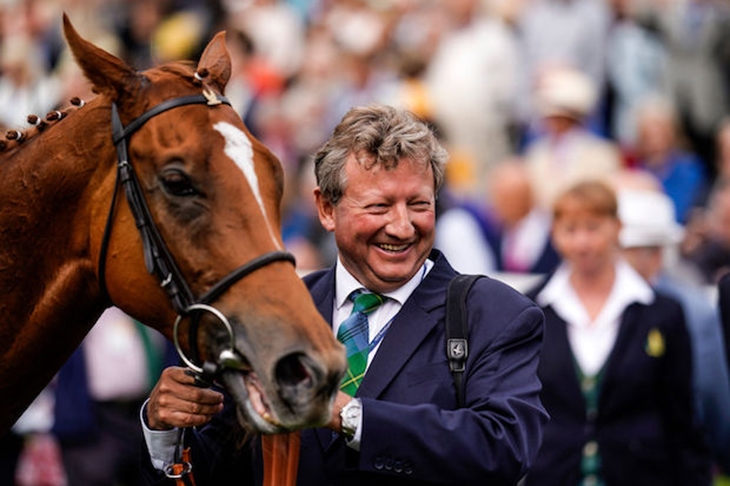An American trainer was once asked to name the greatest quality of the legendary jockey Willie Shoemaker. He replied: ‘The way he meets me in the Winner’s Circle.’ British racehorse owners would probably give the same answer about the Middleham-based trainer Mark Johnston. When Poet’s Society passed the post first in the Clipper Logistics Handicap during York’s Ebor Festival last month, Johnston became the winningmost trainer in British racing history, passing Richard Hannon Snr’s total of 4,193.
The athlete Jesse Owens once declared: ‘In the end it’s extra effort that separates a winner from second place. But winning takes a lot more than that, too. It starts with complete command of the fundamentals. Then it takes desire, determination, discipline and self-sacrifice.’ In an ever-more competitive environment, Johnston’s landmark is to be saluted not just because he is a man with the all-consuming desire to win that drove both Martin Pipe in the yard and A.P. McCoy in the saddle, but also because he is a thinker, an educator of the wider racing public and a revolutionary. He also works harder than almost anybody else in the sport.
Johnston has done it his way. He did not start with a horsey background. There was no setting-up legacy from a well-bred auntie in the shires. He had no pupillage in the yard of a master of his trade but was the son of working-class parents, brought up in an East Kilbride council house. He initially qualified as a vet, before setting up in a remote part of Lincolnshire 31 years ago to test out theories first conceived by training whippets. When he trained his first winner Hinari Video at Carlisle in 1987 there were no specialist racing channels: he recalls that he and wife Deirdre put up the racing results on Teletext and watched the page all evening.
Plenty of people fancy themselves as racehorse trainers: more than 600 have a licence in Britain. But around 250 of those have ten or fewer horses, while Johnston, with the aid now of a team of yard managers, trains well upside of 200. To facilitate the travelling involved, he has acquired a pilot’s licence and a plane. As the most professional website in the game bears witness, his facilities are second to none, with his stable-based vets given every modern aid. Jockeys love to get on Johnston-trained horses because, as the veteran Franny Norton says, ‘They are great rides on horses with good minds and good attitudes.’
Every one is fit to run for its life under the stable motto ‘Always Trying’. Some see a deliberate double entendre there. An eager controversialist with a forceful view on any racing topic from 48-hour declarations to use of the whip, from stable wages to the Derby entry system, Johnston, who has served spells as a Racing Post columnist and an officer of the National Trainers Federation, couldn’t just start an argument in an empty room; he would if necessary build the room.
Like those of Martin Pipe, Johnston’s horses often make the pace. Many used to deride such tactics as merely setting up a race for others, but the Johnston horses don’t wilt. He insists that appearances deceive: horses don’t often accelerate from the back; they appear to do so by passing ones who are slowing down. Asking a horse to accelerate rather than keep up a good rhythm in front is imposing an extra strain. Other trainers run horses four or five times a season; when Poet’s Society won at York, it was the four-year-old’s 26th contest of the year.
If other trainers say they are happier with a maximum of 50 or 60 horses, Johnston argues that that is simply because they cannot attract any more. It is a numbers game and he is like a football manager who insists on having a substitutes bench of equal ability to the players on the pitch. You cannot aim at Classics, he says, unless you have a minimum of 150 horses: ‘If we don’t have a winner in a week we’re going really badly.’ He has trained more than 100 winners every year for 25 years and if there have not perhaps been as many top-class victories as that might suggest, the truth is that he hasn’t had many of the bluebloods that owners send to Sir Michael Stoute or John Gosden. Johnston, however, did have the Derby second this year and his 13 Group One victories include the 2,000 Guineas won by Mister Baileys and the 1,000 won by the dodgy-legged Attraction. Shamardal, who became Europe’s champion two-year-old in his hands, was then transferred to Saeed bin Suroor to win two French Classics.
The question that Johnston’s career raises, though, is how we should determine the title of Champion Trainer, one he has never held. That is because although we call the Champion Jockey the one who has ridden the most winners, the trainers’ championship is decided instead by prize money won. Should quality necessarily beat quantity?






Comments